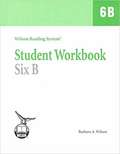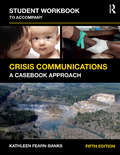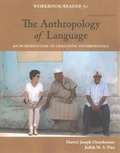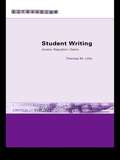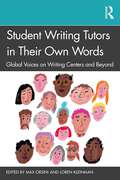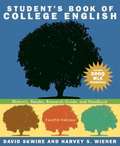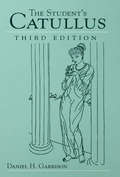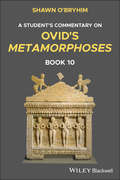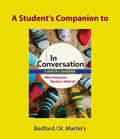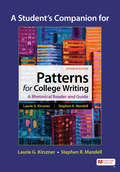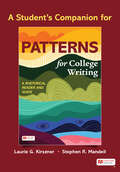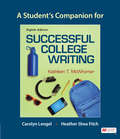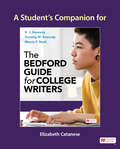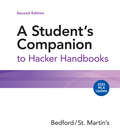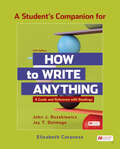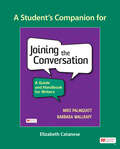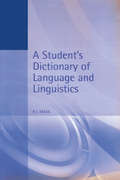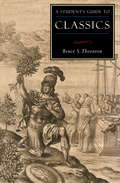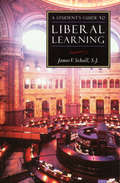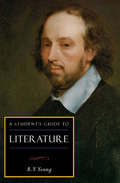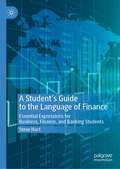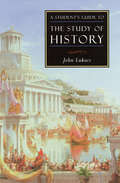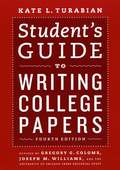- Table View
- List View
Student Workbook Six B (Wilson Reading System)
by Barabara WilsonWilson Reading System, Student Workbook Six B Third Edition by Barabara Wilson.
Student Workbook to Accompany Crisis Communications: A Casebook Approach
by Kathleen Fearn_Banks Kathleen Fearn-BanksNo company, organization, or individual whose livelihood depends on public reaction can afford to function without a crisis communications plan. This student workbook reviews the critical terminologies, processes, and skills needed for understanding and responding to crises. It prepares individuals for responding to crises in a variety of contexts, and reinforces strategies and tactics to be used during a crisis. Chapters include instructive case studies of public relations professionals in crises: what they did, what they wished they had done, and what hampered their progress. The exercises provide students with the opportunity to respond to real-world crises, sharpening their own skills and practicing response behaviors. This workbook will serve as a useful tool for all future practitioners.
Student Workbook with Reader for Anthropology Of Language: An Introduction To Linguistic Anthropology
by Harriet Ottenheimer Judith PineThe workbook/reader provides classic and contemporary exercises and readings as well as information on how to complete the semester-long guided projects. Each Chapter includes a reading, writing/discussion exercises, and guided projects. Exercises range from beginning to intermediate in skill level, with a few advanced exercises included.
Student Writing: Access, Regulation, Desire (Literacies)
by Theresa M. LillisStudent Writing presents an accessible and thought-provoking study of academic writing practices. Informed by 'composition' research from the US and 'academic literacies studies' from the UK, the book challenges current official discourse on writing as a 'skill'. Lillis argues for an approach which sees student writing as social practice.The book draws extensively on a three-year study with ten non-traditional students in higher education and their experience of academic writing. Using case study material - including literacy history interviews, extended discussions with students about their writing of discipline specific essays, and extracts from essays - Lillis identifies the following as three significant dimensions to academic writing: * Access to higher education and to its language and literacy representational resources * Regulation of meaning making in academic writing* Desire for participation in higher education and for choices over ways of meaning in academic writing. Student Writing: access, regulation, desire raises questions about why academics write as they do, who benefits from such writing, which meanings are valued and how, on what terms 'outsiders' get to be 'insiders' and at what costs.
Student Writing Tutors in Their Own Words: Global Voices on Writing Centers and Beyond
by Max OrsiniStudent Writing Tutors in Their Own Words collects personal narratives from writing tutors around the world, providing tutors, faculty, and writing center professionals with a diverse and experience-based understanding of the writing support process. Filling a major gap in the research on writing center theory, first-year writing pedagogy, and higher education academic support resources, this book provides narrative evidence of students' own experiences with learning assistance discourse communities. It features a variety of voices that address how academic support resources such as writing centers have served as the nucleus for students' (i.e., both tutors and their clients) sense of community and self, ultimately providing a space for freedom of discourse and expression. It includes narratives from writing tutors supporting students in unconventional spaces such as prisons, tutors offering support in war-torn countries, and students in international centers facing challenges of distance learning, access, and language barriers. The essays in this collection reveal pedagogical takeaways and insights about both student and tutor collaborative experiences in writing center spaces. These essays are a valuable resource for student writing tutors and anyone involved with them, including composition instructors and scholars, writing center professionals, and any faculty or administrators involved with academic support programs.
Student Writing Tutors in Their Own Words: Global Voices on Writing Centers and Beyond
by Max OrsiniStudent Writing Tutors in Their Own Words collects personal narratives from writing tutors around the world, providing tutors, faculty, and writing center professionals with a diverse and experience-based understanding of the writing support process.Filling a major gap in the research on writing center theory, first-year writing pedagogy, and higher education academic support resources, this book provides narrative evidence of students' own experiences with learning assistance discourse communities. It features a variety of voices that address how academic support resources such as writing centers have served as the nucleus for students' (i.e., both tutors and their clients) sense of community and self, ultimately providing a space for freedom of discourse and expression. It includes narratives from writing tutors supporting students in unconventional spaces such as prisons, tutors offering support in war-torn countries, and students in international centers facing challenges of distance learning, access, and language barriers. The essays in this collection reveal pedagogical takeaways and insights about both student and tutor collaborative experiences in writing center spaces.These essays are a valuable resource for student writing tutors and anyone involved with them, including composition instructors and scholars, writing center professionals, and any faculty or administrators involved with academic support programs.
Student's Book of College English: Rhetoric, Reader, Research Guide, and Handbook
by David Skwire Harvey WienerA complete course in writing, in one comprehensive volume <P><P> Acclaimed for its clarity and accessibility, Student’s Book of College English, Fourteenth Edition offers a rhetoric, reader, research guide, and handbook in one cohesive and efficient presentation. The rhetoric appeals to students with its straightforward and jargon-free style. Instructors appreciate its coverage of the writing process, the rhetorical modes (including argumentation), and its chapter on writing about literature. The reader includes selections from sources ranging from academia to the Internet on timely topics that pique students’ interest. The in-depth coverage of research methods, as well as the complete treatment of grammar and usage, make an ancillary handbook unnecessary, a cost-savings enjoyed by students and teachers alike.
Student's Book of College English: Rhetoric, Reader, Research Guide, and Handbook
by David Skwire Harvey S. WienerThis rhetoric/reader/research guide/handbook offers students a complete course in writing in the rhetorical modes. This 12th edition offers sound instruction in the rhetorical strategies, strong professional and student readings, thorough coverage of argumentation and research, and a reference handbook with self-test exercises.
Students Catullus: Third Edition (Oklahoma Series In Classical Culture #Vol. 5)
by Daniel H. GarrisonFirst published in 2004. Routledge is an imprint of Taylor & Francis, an informa company.
A Student's Commentary on Ovid's Metamorphoses Book 10
by Shawn O'BryhimDiscover a holistic perspective on Ovid’s Metamorphoses Book 10 with this insightful resource. In A Student’s Commentary on Ovid’s Metamorphoses Book 10, Shawn O’Bryhim offers an insightful and concise examination of the literary, grammatical, and textual matters integral to Book 10 of Ovid’s Metamorphoses. Expanding the scope of more traditional textbooks on Book 10, the author explores the archaeological, religious, and cultural elements of the work as it relates to Greece, Rome, and the Near East. Readers will benefit from the inclusion of: A multidisciplinary approach that examines the religious, archaeological, and cultural background of Ovid’s myths A Near Eastern perspective on the material, which will allow a deeper understanding of the subject matter An exploration of the grammatical and literary components that characterize Book 10 Intended primarily for undergraduates in advanced Latin courses on Ovid, A Student’s Commentary on Ovid’s Metamorphoses Book 10 will also earn a place in the library of anyone who desires a broader approach to the study of Book 10 of the Metamorphoses.
A Student's Companion for In Conversation: A Writer's Guidebook
by Bedford/St.Martin'sA Student’s Companion to In Conversation helps writers make the most of their handbook and their composition course. Its practical workbook format and attention to key topics taught in the course make it a useful tool for boosting student performance. Part 1 includes common college success strategies such as time management. Part 2 covers topics common to first-year composition such as essay development, active reading, audience awareness, peer review, revision, and working with sources. Part 3 includes 16 graphic organizers that help more visually-oriented students plan and organize different types of writing. And Part 4 includes exercises in sentence-level topics including parallelism, subject-verb agreement, fragments, using commas and quotation marks, and more. Offering more than 60 exercises and dozens of activities to engage students in the work of the course, A Student’s Companion to In Conversation helps new academic writers get and stay on-level.
A Student’s Companion for Patterns for College Writing
by Laurie G. Kirszner Stephen R. MandellFor students who need a little extra support, A Student’s Companion for Patterns for College Writing reinforces the most foundational elements in academic writing. This supplement breaks down the steps necessary to excel in college writing while recognizing and respecting students’ abilities. The second edition of this companion volume has been updated to add what instructors have asked us for: more grammar coverage, more sample student papers, and more hands-on practice in the processes of writing and re-writing. It’s the perfect resource for corequisite composition support courses.
A Student's Companion for Patterns for College Writing: A Rhetorical Reader and Guide
by Laurie G. Kirszner Stephen R. MandellPatterns for College Writing provides the most support for your writing course, with clear instruction, models of student and professional writing, and essays on topics that resonate.
A Student’s Companion for Successful College Writing: Skills, Strategies, Learning Styles
by Carolyn Lengel Heather Shea FitchThe eighth edition of Successful College Writing is available for the first time in Achieve, Macmillan’s new digital platform. Achieve was co-developed with instructors and students to support best practices in commenting on student drafts, and includes a full e-book, a set of reading comprehension quizzes, and fully customizable book-specific writing assignments. <p><p> Successful College Writing moves first-year composition students—whatever their level of preparedness—toward achieving their goals in college through a unique visual approach and extra support for academic reading and writing. <p> Kathleen T. McWhorter’s supportive, visual approach is evident in graphic organizers, flowcharts, and Guided Writing Assignments that provide hands-on writing activities and practical, step-by-step instruction for drafting and revising.
The Student's Companion for The Bedford Guide for College Writers
by X. J. Kennedy Dorothy M. Kennedy Elizabeth CataneseThe Student’s Companion to The Bedford Guide for College Writers supports students taking a co-requisite or ALP course alongside first-year composition.
A Student's Companion to Hacker Handbooks with 2021 MLA Update
by Bedford/St.Martin'sThis ebook has been updated to provide you with the latest guidance on documenting sources in MLA style and follows the guidelines set forth in the MLA Handbook, 9th edition (April 2021).Writers develop over time. And the fact is, some writers need more time and more practice to develop the skills and habits that help them meet the challenges of the first-year writing course. For those students enrolled in paired, co-requisite, or ALP sections, A Student’s Companion to Hacker Handbooks offers practical support that will help them get up to speed and perform on-level.
A Student's Companion to How to Write Anything with Readings: A Guide and Reference
by Elizabeth Catanese John J. Ruszkiewicz Jay T. DolmageOffering practical support for students in corequisite composition courses (including ALP, support, labs, workshops, etc.), the Student’s Companion provides tips for student success, including advice about time management, academic planning, and test anxiety, as well as sentence strategies for academic writing. Available at no additional cost to students when packaged with How to Write Anything. Also available in Achieve.
A Student's Companion to Joining the Conversation: A Guide and Handbook for Writers
by Mike Palmquist Barbara Wallraff Elizabeth CataneseThe Student’s Companion supports students taking a co-requisite or ALP course alongside first-year composition. This workbook includes college success strategies; activities to help students develop their writing; and additional practice in correcting writing problems.
A Student's Dictionary of Language and Linguistics (Arnold Student Reference)
by Larry TraskThe terminology used in linguistics can be confusing for those encountering the subject for the first time. This dictionary provides accessible and authoritative explanations of the terms and concepts currently in use in all the major areas of language and linguistics, (pronunciation, word structure, sentence structure, meaning) as well as in the study of the social, anthropological, psychological and neurological aspects of language. Entries are clear and unambiguous, and helpful examples are used to clarify where appropriate. Particular attention is given to the terminology of traditional grammar. There are entries for the names of major language families, and there are also brief biographical entries for the major figures in the field, past and present. An extensive cross-referencing system makes the book easy to use: an invaluable annotated bibliography of texts on linguistics makes it an ideal guide for everyone beginning the study of language and linguistics.
A Student's Guide to Classics (ISI Guides to the Major Disciplines)
by Bruce S. ThorntonBruce Thornton's crisp and informative Student's Guide to Classics provides readers with an overview of each of the major poets, dramatists, philosophers, and historians of ancient Greece and Rome. Including short bios of major figures and a list of suggested readings, Thornton's guide is unparalleled as a brief introduction to the literature of the classical world.
A Student's Guide to Liberal Learning: Liberal Learning Guide (ISI Guides to the Major Disciplines)
by James V. SchallA Georgetown professor&’s look at the subjects one needs to study for a truly well-rounded education. A Student&’s Guide to Liberal Learning is an inviting conversation with a learned scholar about the content of an authentic liberal arts education. It surveys ideas and books central to the tradition of humanistic education that has fundamentally shaped our country and our civilization. This accessible volume argues for an order and integration of knowledge so that meaning might be restored to the haphazard approach to study currently dominating higher education. Freshly conveying the excitement of learning from the acknowledged masters of intellectual life, this guide is also an excellent blueprint for building one&’s own library of books that matter.
A Student's Guide to Literature: Literature Guide (ISI Guides to the Major Disciplines)
by R.V. YoungExplore the works of Western literature that have stood the test of time—and discover titles to enrich your own book collection.A Student&’s Guide to Literature takes up these questions: In a time of mass culture and pulp fiction, can great literature still be discerned, much less defended? Why is literature so compelling? What should we read? Literary scholar R. V. Young addresses these timely issues in this guide to Western literature and poetry. He demonstrates that literature liberates the mind from cultural and temporal provincialism by expanding our intellectual and emotional horizons. Learn how great fiction and poetry are integral to a liberal education, and visit the classic works of literature again—or for the first time.
A Student’s Guide to the Language of Finance: Essential Expressions for Business, Finance, and Banking Students
by Steve HartThis book focuses on improving reading comprehension by targeting the jargon, idiomatic language and academic expressions used in the business world. A Student’s Guide to the Language of Finance is a reference textbook designed to unlock the jargon of the business and finance world for international students, improving the reading comprehension and writing skill of English language learners by targeting the jargon, idiomatic language, and academic expressions employed in the business, finance, and banking fields. Covering terms not always captured in business dictionaries or workbooks, the resource also contains sections on spoken business English, key academic terms found in textbooks and journals and useful expressions to employ when writing an academic paper. It is specifically targeted at students whose first language is not English.
A Student's Guide to the Study of History (ISI Guides to the Major Disciplines #15)
by John LukacsA thoughtful look at the value of learning from the past: &“Nobody has done more than John Lukacs to turn the short history book into an art form&” (Antony Beevor, Toronto Globe & Mail). To study history is to learn about oneself. And to fail to grasp the importance of the past—to remain ignorant of the deeds and writing of previous generations—is to bind oneself by the passions and prejudices of the age into which one is born. John Lukacs, one of today&’s most widely published historians, explains what the study of history entails, how it has been approached over the centuries, and why it should be undertaken by today&’s students. This guide is an invitation to become a master of the historian&’s craft.
Student's Guide to Writing College Papers (4th edition)
by Kate L. Turabian Gregory G. Colomb Joseph M. WilliamsThis new edition is both a solid introduction to the research process and a convenient handbook to the best practices of writing college papers.
